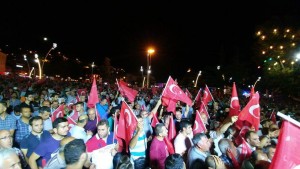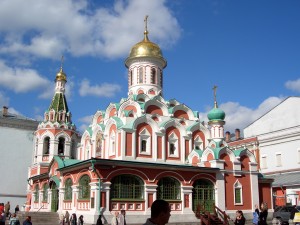Today in National Catholic Reporter, Michael Sean Winters writes that the Church is at her best at funerals. And by gum, he likes those funerals like he likes his booze — straight up, no umbrellas:
Still less should those who have just lost a loved one be expected to devise an entire service. In the late 1980s and early 1990s, I ran a bookstore/café here in Washington and we lost many waiters, bartenders and cooks to the AIDS epidemic. Some of them had no religion and had left the request that their friends host a memorial service. These were dreadful. Lacking a liturgy, these memorial services consisted mostly of eight or so eulogies from friends, but because the friends had not coordinated their talks, the eulogies were invariably repetitive. And, because few people’s friends have been trained in public speaking, they lack a pastor’s ability to articulate clearly, measure the cadence of their words, and fill the room when the microphone fails, all of which are essential to communication. Finally, and most importantly, people who are unaccustomed to speaking about the tragedies of life may seek to give expression to their deepest sentiments but they can easily lapse into sentimentality. Every time I attended one of these unscripted memorial services, I gave thanks for the Catholic liturgy.
Second, in our culture, there are reference points in the musical canon that help us to wrestle with the mystery of suffering and death, and these great cultural touchstones are invariably religious. Wednesday, at Joe’s funeral, the soprano soloist Ellen Kliman sang “I Know that my Redeemer Liveth” from Handel’s “Messiah.” At the Offertory, the mezzo-soprano Jennifer Goltz sang the Bach-Gounod “Ave Maria.” At Communion, the quartet sang Bach’s “Sheep May Safely Graze” and Faure’s “In Paradisum.” These works of music do for a grieving family and community what words alone cannot do; they transport us emotionally. The emotions arrive at a place that is musically beautiful but utterly honest: These works of music haunt as well as comfort, inspire as well as ground the emotions, they grapple with the reality of death and new life that is at the heart of our faith. Maybe, in our secular age, there will be musical geniuses like Faure and Bach and Handel to write secular works of music that achieve similar emotional dexterity and profundity, but I doubt it and, in any event, there has certainly been no Bach in this century.
I can’t help thinking he’s being a bit rough on canonically unapproved funerals. So what if the speakers happen to be sentimental slobs? Maybe the decedent liked them that way. I, for one, wil be most indignant if nobody says anything gushy or silly about me when I’m gone. And if the music’s tacky, well, maybe the dead guy had no taste. Maybe the next of kin didn’t, either. They could have danced to “Wind Beneath My Wings” and made love to Enya, bless their hearts. If a funeral is not, in fact, a floor show, why critique the entertainment like John Simon?
In my adult life, I’ve attended — knock wood — only two funerals. Both were religious. In both cases the — what shall I call it? The effect? The vibe? The gestalt? — had much less to do with the service itself than with the way the guest of honor had died, and the sorts of relationships he’d left behind.
The first was my dad’s. He died very suddenly one summer morning, of an allergic reaction to a bee sting. Nobody had seen it coming. All of his friends were on vacation, so the turnout was very small, Though he hadn’t lived as an observant Jew, he’d determined very early on to be buried as one, which meant that, on the shortest possible notice, his wife had to find: 1) a rabbi; 2) a team of Jews to wash and stand guard over the body until it was time for the service. (I believe these are called shomrim, but I could be wrong.)
In Manhattan, this would have been a cakewalk. He had lived on West 76th Street, only 50 yards east of Riverside Memorial Funeral Home. At the time of his death, however, he’d been three hours north, at his country house in the Catskills. Since Jewish law requires that a body be buried as soon as possible after death — within 24 hours is the ideal — there was no question of lugging him all the way back to the City. She had to find her talent locally.
That was harder than it sounds. By the time my dad bought his house, the Jews had migrated out of the Catskills — except, that is, for a colony of Lubavitchers, who ran what passed, according to their tastes, for a resort only half an hour away. For a Jew, helping to bury another Jew is a mitzvah, or commandment. Even if you wouldn’t have known him from Adam, even if he never observed any commandments himself, you’re still supposed to pitch in. So they sent over a rabbi who looked like he’d been ordained at eleven-thirty the previous night, along with an assistant who looked, marginally, younger.
They did a surprisingly good job. During his very simple homily, the rabbi admitted not knowing my father, and read a few touching e-mails friends had sent. At the gravesite, he coached me and my half-brothers line-by-line through the Kaddish. (A good thing, too — none of us knew any of it past the first line. We mumbled, “Yisgadal yisgadash, um, uh, mm, crap” sounding for all the world like SNL’s Frankenstein, Tonto and Tarzan.)
But even though everyone did the rites right, it just didn’t work. My dad had died too suddenly, and left us with too many mixed feelings. None of the rituals left anyone feeling less frazzled than before. One exception might have been my aunt, who exclaimed brightly, “Well, I guess I’m an only child now!”
The second funeral was for the head of my old parish’s RCIA program. To the worst which-would-you-rather question — that is, to die a quick and messy death or a slow and lingering one — he’d split the difference and had a quick and lingering death. In March, he was diagnosed with malignant melanoma; by April, he was gone.
I hadn’t known him very well, so I attended the service mostly as a voyeur. It was beautiful — the church was packed, which meant there must have been 400 people in attendance. As far as I can tell, everyone felt an unqualified affection for the man. His family seemed to love him, his community liked him, and I’d always felt a solid admiration for him. I remember looking around and thinking, “Wow, this is the kind of legacy I’d like to leave behind me.” The statements of his son, his sister and I believe his wife — which did, at times, get a bit weepy — just reinforced that thought. Just to make it clear I’m comparing apples to apples, everyone — not just the tourists like me — left the service looking vivified, and kept up that appearance through the luncheon that followed.
If two guys had come out and performed a Tyrolean fish-slapping dance, I doubt it would have changed the mood one bit.











